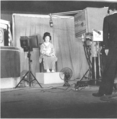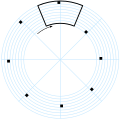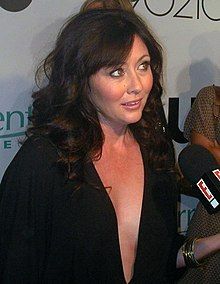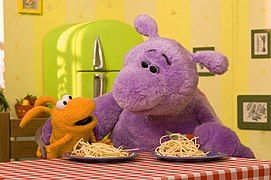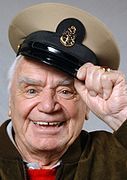Portal:Television
The Television Portal

Television (TV) is a telecommunication medium for transmitting moving images and sound. Additionally, the term can refer to a physical television set rather than the medium of transmission. Television is a mass medium for advertising, entertainment, news, and sports. The medium is capable of more than "radio broadcasting," which refers to an audio signal sent to radio receivers.
Television became available in crude experimental forms in the 1920s, but only after several years of further development was the new technology marketed to consumers. After World War II, an improved form of black-and-white television broadcasting became popular in the United Kingdom and the United States, and television sets became commonplace in homes, businesses, and institutions. During the 1950s, television was the primary medium for influencing public opinion. In the mid-1960s, color broadcasting was introduced in the U.S. and most other developed countries.
In 2013, 79% of the world's households owned a television set. The replacement of earlier cathode-ray tube (CRT) screen displays with compact, energy-efficient, flat-panel alternative technologies such as LCDs (both fluorescent-backlit and LED), OLED displays, and plasma displays was a hardware revolution that began with computer monitors in the late 1990s. Most television sets sold in the 2000s were still CRT, it was only in early 2010s that flat-screen TVs decisively overtook CRT. Major manufacturers announced the discontinuation of CRT, Digital Light Processing (DLP), plasma, and even fluorescent-backlit LCDs by the mid-2010s. LEDs are being gradually replaced by OLEDs. Also, major manufacturers have started increasingly producing smart TVs in the mid-2010s. Smart TVs with integrated Internet and Web 2.0 functions became the dominant form of television by the late 2010s.[better source needed] (Full article...)
Selected article -
"Favorite Son" is an episode of the American science fiction television series Star Trek: Voyager. First broadcast on UPN on March 19, 1997, it was the 20th episode of the third season. Lisa Klink wrote and Marvin V. Rush directed the episode. Set in the 24th century, the show follows the adventures of the crew of the starship USS Voyager after they are stranded in the Delta Quadrant, far from the rest of the Federation.
In the episode, Ensign Harry Kim (Garrett Wang) experiences déjà vu and develops a rash when the Voyager enters a new sector of the Delta Quadrant. Mostly female aliens known as Taresians tell him that he is not human but is a member of their species. On discovering this is a ruse by the female aliens to attract and kill their men during reproduction, the crew rescues Kim and restores him to his original state. Deborah May and Kristanna Loken play two of the Taresians, Patrick Fabian portrays a man tricked by them and Irene Tsu appears as Kim's mother.
Selected image -
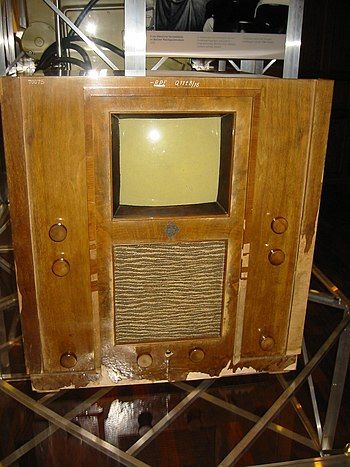
Early television model, from 1936, produced by Telefunken, Germany
Did you know (auto-generated) -

- ... that Angelito de Canal 13, the mascot of the Chilean television network Canal 13, was inspired by its creator's son?
- ... that Paul Dini was a writer for both the animated television series Batman: The Animated Series and the video game series Batman: Arkham?
- ... that a television station spent so little on programming that a media columnist called it the "IOUs of Cincinnati"?
- ... that the 2017 acquisition of Katz Broadcasting by the E. W. Scripps Company was seen as a validation of the business of diginets?
- ... that Alan Rosen once sold 2,400 cheesecakes in four minutes to television shoppers?
- ... that due to her leftist beliefs, journalist Ana Amado was told not to come to work by her public television employer while her husband was on the death list of the Argentine Anticommunist Alliance?
Selected quote -
More did you know
- ...that the book The Psychology of The Simpsons uses this TV series to analyze topics in psychology including clinical psychology, cognition and Pavlovian conditioning?
- ...that one of the television advertisements from the Good things come to those who wait Guinness advertising campaign was voted the "Best ad of all time" by the British public?
- ...that children up to the age of five can find it difficult to distinguish between television programmes and toy advertising campaigns?
- ...that the WWF in 1986 introduced a stable of masked wrestlers to keep the injured wrestler Andre the Giant on television, but off the ring?
- ...that Great American Country television host Nan Kelley (then Nan Sumrall) became Miss Mississippi in 1985 after her fellow Mississippian Susan Akin was crowned Miss America?
Selected biography -

George Formby, OBE (born George Hoy Booth; 26 May 1904 – 6 March 1961), was an English actor, singer-songwriter and comedian who became known to a worldwide audience through his films of the 1930s and 1940s. On stage, screen and record he sang light, comic songs, usually playing the ukulele or banjolele, and became the UK's highest-paid entertainer.
Born in Wigan, Lancashire, he was the son of George Formby Sr, from whom he later took his stage name. After an early career as a stable boy and jockey, Formby took to the music hall stage after the early death of his father in 1921. His early performances were taken exclusively from his father's act, including the same songs, jokes and characters. In 1923 he made two career-changing decisions – he purchased a ukulele, and married Beryl Ingham, a fellow performer who became his manager and transformed his act. She insisted that he appear on stage formally dressed, and introduced the ukulele to his performance. He started his recording career in 1926 and, from 1934, he increasingly worked in film to develop into a major star by the late 1930s and 1940s, and became the UK's most popular entertainer during those decades. The film historian Brian McFarlane writes that on film, Formby portrayed gormless Lancastrian innocents who would win through against some form of villainy, gaining the affection of an attractive middle-class girl in the process. (Full article...)
General images
News
- December 28: US professional wrestler Jon Huber dies aged 41
- September 2: Tributes paid to recently deceased US actor Chadwick Boseman
- May 24: Japanese professional wrestler and Netflix star Hana Kimura dies aged 22
- January 16: BBC newsreader Alagiah to undergo treatment for bowel cancer
- Upcoming events
Featured content
Main topics
History of television: Early television stations • Geographical usage of television • Golden Age of Television • List of experimental television stations • List of years in television • Mechanical television • Social aspects of television • Television systems before 1940 • Timeline of the introduction of television in countries • Timeline of the introduction of color television in countries
Inventors and pioneers: John Logie Baird • Alan Blumlein • Walter Bruch • Alan Archibald Campbell-Swinton • Allen B. DuMont • Philo Taylor Farnsworth • Charles Francis Jenkins • Boris Grabovsky • Paul Gottlieb Nipkow • Constantin Perskyi • Boris Rosing • David Sarnoff • Kálmán Tihanyi • Vladimir Zworykin
Technology: Comparison of display technology • Digital television • Liquid crystal display television • Large-screen television technology • Technology of television
Terms: Broadcast television systems • Composite monitor • HDTV • Liquid crystal display television • PAL • Picture-in-picture • Pay-per-view • Plasma display • NICAM • NTSC • SECAM
Categories
WikiProjects

|
You are invited to participate in WikiProject Television, a WikiProject dedicated to developing and improving articles about Television. |
- Main projects
- Sub-projects
Television Stations • American animation • American television • Australian television • British TV • BBC • Canadian TV shows • Television Game Shows • ITC Entertainment Productions • Digimon • Buffyverse • Doctor Who • Degrassi • EastEnders • Episode coverage • Firefly • Futurama • Grey's Anatomy • Indian television • Lost • Nickelodeon • The O.C. • Professional Wrestling • Reality TV • The Simpsons • Seinfeld • South Park • Stargate • Star Trek • Star Wars • Soap operas • Avatar: The Last Airbender • House
- Related projects
Animation • Anime and manga • Comedy • Comics • Fictional characters • Film • Media franchises
What are WikiProjects?
Things you can do

- Place the {{WikiProject Television}} project banner on the talk pages of all articles within the scope of the project.
- Write: Possible Possum
- Cleanup: color television, Alien Nation: Body and Soul, The Sopranos, Alien Nation: Dark Horizon, Alien Nation: The Enemy Within, Alien Nation: Millennium, Aang
- Expand: Timeline of the introduction of color television in countries
- Stubs: Flow (television), Just for Kicks (TV series), Play of the Month, Nova (Dutch TV series), More stubs...
Subportals
Related portals
Associated Wikimedia
The following Wikimedia Foundation sister projects provide more on this subject:
-
Commons
Free media repository -
Wikibooks
Free textbooks and manuals -
Wikidata
Free knowledge base -
Wikinews
Free-content news -
Wikiquote
Collection of quotations -
Wikisource
Free-content library -
Wikiversity
Free learning tools -
Wiktionary
Dictionary and thesaurus








